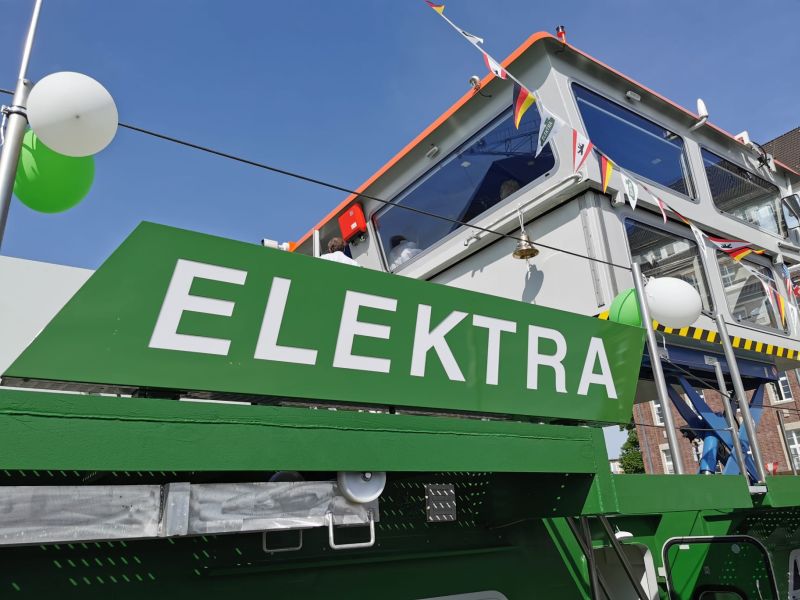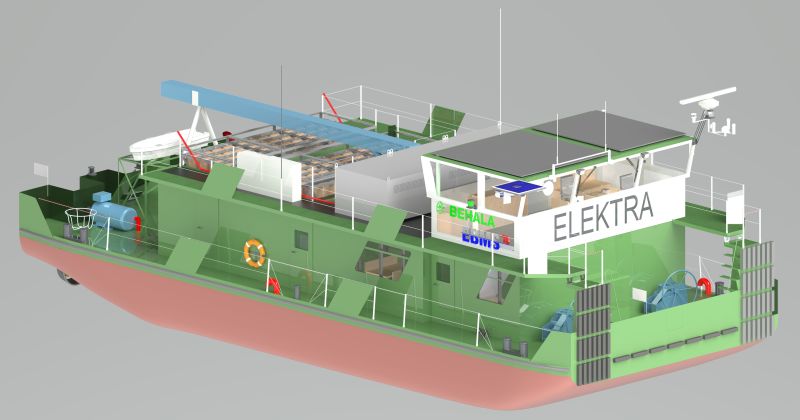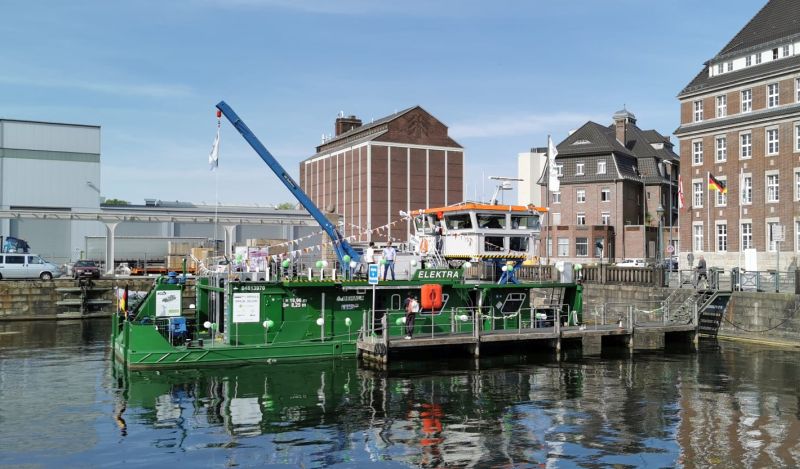

In Berlin’s Westhafen, the Mayor of Berlin Franziska Giffey named the push boat ELEKTRA! After almost two years of construction at shipyard Hermann Barthel GmbH in Derben and the transfer to the Westhafen in Berlin, the long-term testing of this unique, innovative and emission-free push boat begins.


Petra Cardinal, Managing Director of BEHALA, welcomed around 250 guests who gathered at Harbor Basin II. Among them were numerous representatives from politics and authorities as well as project partners and other guests.
In his opening speech, Federal Minister Dr. Volker Wissing spoke about on the importance of hydrogen mobility to achieve the German government’s climate protection goals. “The ELEKTRA is a Lighthouse project: It is the world’s first push boat in which battery-electric propulsion is combined with hydrogen and fuel cell technology. The entire project is a blueprint for the climate and environmentally friendly inland shipping, not only technically but also in terms of regulation real pioneering work.”


Prof. Dr.-Ing. Gerd Holbach, overall project manager from the Technical University of Berlin, briefly explained the overall project, the concept and the design of the innovative push boat. The Mayor of Berlin, Franziska Giffey, spoke the formula “I name you ELEKTRA, wish the crew always a safe journey and you always a hand’s breadth of water under the keel” and christened the ship.


She said: “The world’s first zero-emission push boat is the impressive result of the cooperation between stakeholders from the shipbuilding, energy and propulsion technology industries. I’m particularly pleased that a lot of Berlin’s ingenuity flowed into the development and construction of ELEKTRA. This lighthouse project shows us how we can succeed, by implementing innovative ideas, in improving the climate on our access waterways for the long-term. Berlin wants to be a pioneer here.” Miss Dr. Corinna Barthel from Barthel Werft congratulated the godmother and spoke about the special features of building the ELEKTRA.
Under the project management of the Dept. of Maritime Systems Design and Operations at the Technical University of Berlin, BEHALA – Berliner Hafen- und Lagerhausgesellschaft – (logistics), shipyard Hermann Barthel, BALLARD Power Systems (fuel cells), Argo-Anleg (hydrogen system), SER Schiffselektronik Rostock (electrical energy system), EST-Floattech (battery system) and HGK Shipping (nautical operation) are involved in the development, construction and testing of the push boat ELEKTRA.


As the first emission-free ship, the ELEKTRA will serve as a role model, because its power system is designed to be applicable to a variety of barge and coastal vessel types. Also, this is not only about providing energy for the ship’s propulsion and pushing convoys, but also about the energy for the crew, who live, cook and wash on board.
In addition to propulsion, the system provides energy for the temperature control of the cabins and the wheelhouse. The battery system also needs a certain ‘comfortable temperature’ for efficient operation and a long lifespan. All of this must be done with a limited amount of carried energy and without loss of operational range.


The waste heat from the fuel cells is used through continuous water cooling and the cabins are heated by a brine heat pump. An additional advantage is that the ship always operates in water with temperatures above 0°C under its keel.
The use of a self-developed energy management system and a digital sailing assistant support the captain and logistics planner with the planning of operations and transports.
With 750 kg of gaseous hydrogen (at a pressure of 500 bar) on board and a battery capacity of approx. 2,500 kilowatt hours, the ship has a range of approx. 400 kilometres when sailing in combination with the loaded heavy lift barge URSUS.
Therefore, next to the Westhafen in Berlin, only one additional land-based station is needed to supply the ELEKTRA with hydrogen and electricity to sail on the waterways of Berlin in the direction of the Rhine/Ruhr, Hamburg and Stettin. In total the vessel can operate push-barge combinations up to 150 m in length.
The first stations for the changeover of hydrogen tanks and 500 kilowatt electric charging stations will be operational in Berlin’s Westhafen as well as in the port of Lüneburg in 2023.


The TU Berlin has contracted Mittelelbe Business Park and H2 Green Power & Logistics for filling and transporting the tank systems (Multiple Energy Gas Container – MEGC) with green hydrogen until the end of the ELEKTRA project at the end of 2024.
The MEGC can be exchanged with the onboard crane and the power connection runs via a loading beam that guide the cables to land. This way the handling of the arm-thick cables is very easy for the ship’s crew, the vessel is connected to the charging station in a short time and the quayside is free of cables.
Testing the ELEKTRA will initially take place in the capital region; as of 2023 the tests will also be continued on long-distance routes towards Hamburg.
After completion the partnership project will have learned a lot; it will then also be able to say how future commercially viable inland shipping vessels and coastal ships can be optimally equipped for the many purposes in this performance class and what concepts can look like for other ship types and performance classes.
With a total project volume of approx. 14.6 million euros, the project is being funded by the Federal Ministry for Digital and Transport (BMDV) funded with approx. 9.1 million euros and supported and coordinated by project manager Jülich (PTJ) and the National Organization for Hydrogen and Fuel Cell Technology (NOW).
Press Release










We believe that knowledge is power, and we’re committed to empowering our readers with the information and resources they need to succeed in the merchant navy industry.
Whether you’re looking for advice on career planning, news and analysis, or just want to connect with other aspiring merchant navy applicants, The Marine Learners is the place to be.